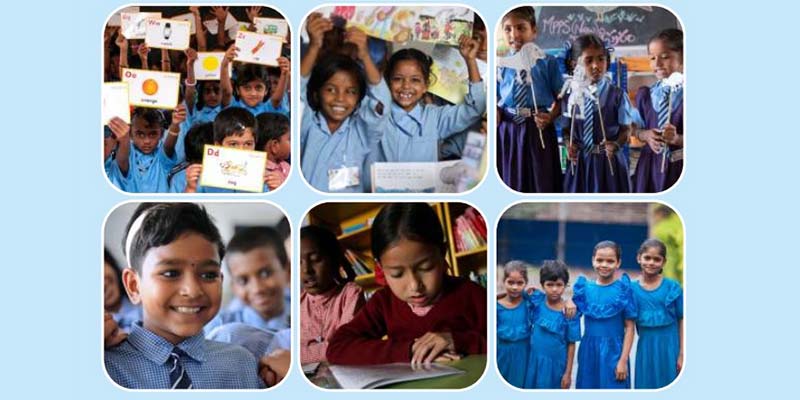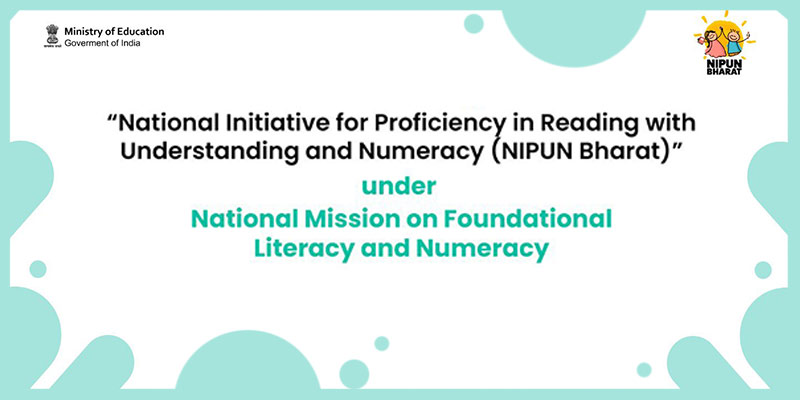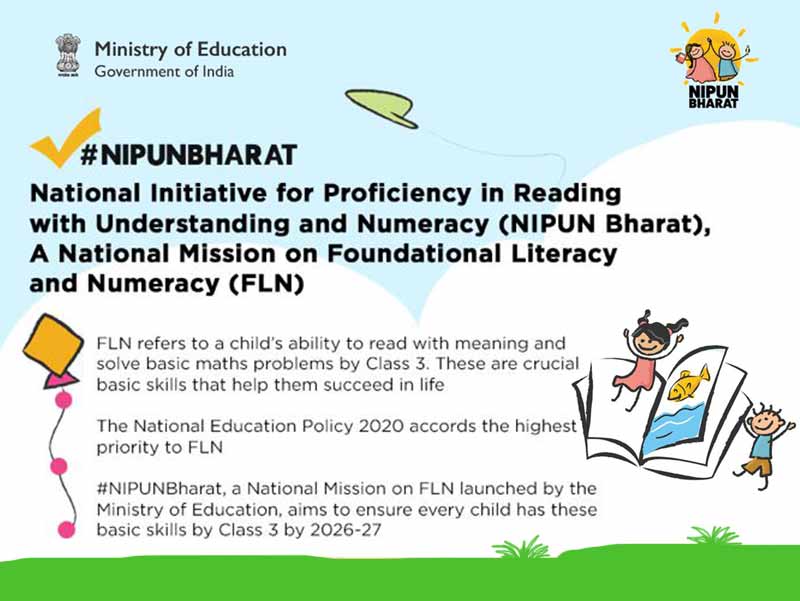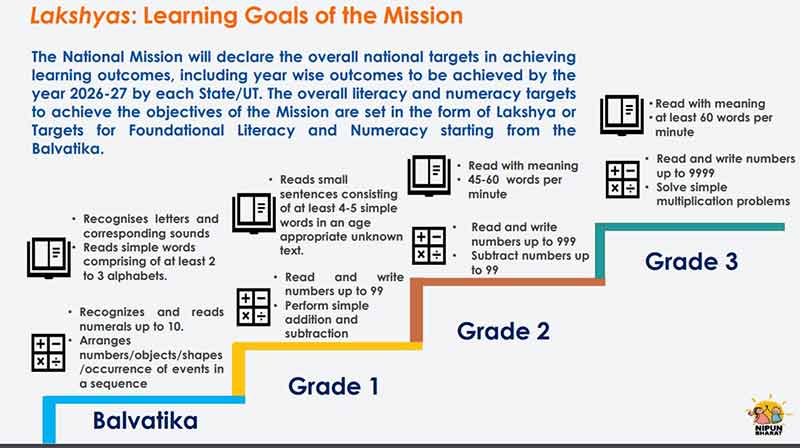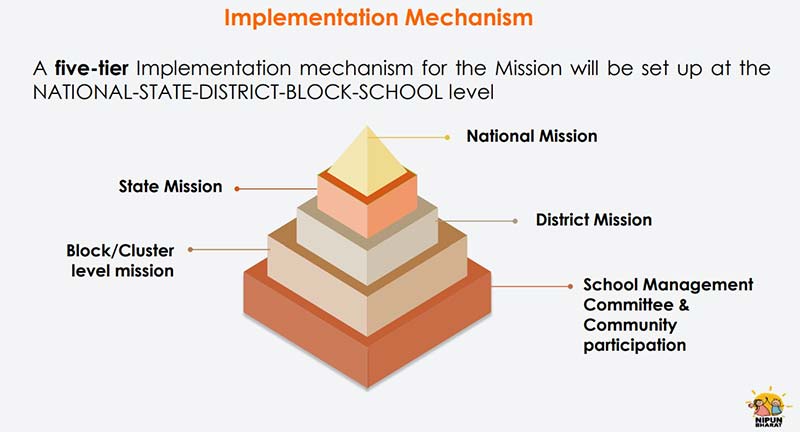- India
- Jul 05
The importance of NIPUN Bharat mission
Union Education Minister Ramesh Pokhriyal ‘Nishank’ virtually launched the ‘National Initiative for Proficiency in Reading with Understanding and Numeracy’ (NIPUN Bharat) on July 5.
The main goal of the mission is to ensure that every child in the country necessarily attains foundational literacy and numeracy by the end of Grade 3, by 2026-27.
National Mission on Foundational Literacy and Numeracy
• To address aspects of quality of learning and achieve the goal of attaining foundational literacy as envisaged by National Education Policy (NEP) 2020 and Atmanirbhar Bharat campaign, it has been decided to establish and launch a National Mission on Foundational Literacy and Numeracy.
• The National Education Policy (NEP) 2020 highlights that a large proportion of students currently in elementary level, have not achieved foundational literacy and numeracy (FLN).
• The NEP 2020, further reiterates that it is imperative to address this crisis head on and immediately so that basic learning can be accomplished in schools, and all students may thereby gain the opportunity to obtain an education of quality.
• Attaining foundational literacy and numeracy for all children must become an immediate national mission. Students, along with their schools, teachers, parents, and communities, must be urgently supported and encouraged in every way possible to help carry out this all-important target and mission, which indeed forms the basis of all future learning.
• Recognising the crucial role of foundational skills in national development, it was announced that a National Foundational Literacy and Numeracy Mission is being launched, for ensuring that every child in the country necessarily attains foundational literacy and numeracy by the end of Grade 3, by 2026-27.
• For this purpose, a vibrant curricular framework, engaging learning material (both online and offline), defined and measurable learning outcomes, teacher capacity building, assessment techniques, etc will be developed to take it forward in a systematic fashion.
• In this context, a National Mission on Foundational Literacy and Numeracy called ‘National Initiative for Proficiency in Reading with Understanding and Numeracy (NIPUN Bharat)’ is set up by the ministry of education.
• The national mission lays down priorities and actionable agendas for states/UTs to achieve the goal of proficiency in foundational literacy and numeracy for every child by the end of Grade 3.
• The Mission will be set up under the aegis of the centrally sponsored scheme of Samagra Shiksha, which is an integrated scheme of school education covering from pre-school to senior secondary level.
• It will focus on children of the age group of 3 to 9 years including pre-school to Grade 3.
Providing access to schooling not enough
• The educational reforms in elementary education instituted in the country during the 1990s and beyond (for example, District Primary Education Programme, Sarva Shiksha Abhiyan (SSA), Right to Education Act, 2009) have provided access to schooling in the 6–14 year age group across the country and paved way for children from all strata of the society to reach school.
• Various enabling provisions such as neighbourhood schools, free textbooks, free uniforms, transport/escort facilities, infrastructure support, residential schools and hostels, etc have been provided to facilitate access to children to schools. However, access does not automatically result in quality of education and to ensure that children are retained in school, quality education is the key.
• To ensure quality at the foundational years of schooling, the ministry of education had launched a nationwide sub-programme of Sarva Shiksha Abhiyan — Padhe Bharat Badhe Bharat (PBBB) — on August 26, 2014 with focus on early reading and writing with comprehension, and early mathematics.
• In the last few years, several states, like Assam (Reading Improvement Programme), Chhattisgarh, Rajasthan, Uttarakhand, Uttar Pradesh, Odisha, and West Bengal (Early Grades Reading and Numeracy), have implemented learning improvement programmes targeting children in Classes 1 and 2. Most of these programmes have been around improving early reading/literacy, following varied approaches and methodologies.
• A few states, such as Punjab and Meghalaya have experimented with implementing programmes to improve the learning levels of children in mathematics.
Global scenario
• Globally, six out of 10 children and adolescents are not achieving minimum proficiency levels in reading and mathematics. The UNESCO Institute for Statistics (UIS) has estimated that 617 million children and adolescents worldwide are not achieving minimum proficiency levels in reading and mathematics.
• Globally, of those who completed primary education, one in two did not have basic reading skills.
• The data also highlights that Central and Southern Asia has the second highest rate of children and adolescents not learning. Across the region, 81 per cent of children and adolescents (241 million) will not meet minimum proficiency levels in reading by the time they are of age to complete primary and lower secondary education.
Focus on children of age group of 3 to 9 years
• Recognising the importance of early learning, the National Education Policy 2020 states that “Our highest priority must be to achieve universal foundational literacy and numeracy by the end of Grade 3, by 2026-27”.
• The rest of the policy will be largely irrelevant for such a large portion of our students if this most basic learning (reading, writing, and arithmetic at the foundational level) is not first achieved.
• The Mission will focus on children of the age group of 3 to 9 years including pre-school to Grade 3, children prior to age 5 and before entering to Class 1 will be attending Balvatika in Anganwadis or primary schools having pre-primary sections.
• With the aim to establish strong linkage and smooth transition between pre-school stage and Grade 1, Early Childhood Care and Education (ECCE) Curriculum Framework developed by NCERT will be followed by both Anganwadis and Pre-primary schools to ensure smooth transition to Grade 1.
• The children who are in Classes 4 and 5 and have not attained the foundational skills will be provided age appropriate and supplementary graded learning materials to acquire the necessary competencies.
Major objectives of the mission are:
• To enable children to become motivated, independent, and engaged readers and writers with comprehension possessing sustainable reading and writing skills.
• To make children understand the reasoning in the domains of number, measurement, and shapes, and enable them to become independent in problem solving by way of numeracy and spatial understanding skills.
• To ensure availability and effective usage of high-quality and culturally responsive teaching learning material in children’s familiar/home/mother language(s).
• To focus on continuous capacity building of teachers, head teachers, academic resource persons and education administrators.
• To actively engage with all stakeholders — teachers, parents, students and community, policy makers for building a strong foundation of lifelong learning.
• To ensure assessment ‘as, of and for’ learning through portfolios, group and collaborative work, project work, quizzes, role plays, games, oral presentations, short tests, etc.
• To ensure tracking of learning levels of all students.
• To ensure an equitable and inclusive classroom environment by incorporating play, discovery, and activity-based pedagogies, linking it to the daily life situations of the children and formal inclusion of children’s home languages.
Implementation mechanism
• NIPUN Bharat covers key technical aspects of foundational literacy and numeracy as well as the administrative aspects for effectively setting up an implementation mechanism at the national, state, district, block and school level.
• The department of school education and literacy under the ministry of education will be the implementing agency of the FLN Mission at the national level.
• States/UTs would be creating multi-year action plans to achieve their respective FLN targets. Thus, an implementation framework consisting of roadmaps and annual action plans for implementing activities covering all the focus areas of the FLN Mission would need to be prepared.
• An approval of Rs 2,688.18 crore has already been given under Samagra Shiksha scheme to states and UTs for implementation of the various interventions for the Foundational Stage in 2021-22.
• The success of NIPUN Bharat will primarily depend on teachers, so, there will be a special emphasis on capacity building of teachers.
• A special package for foundational literacy and Numeracy under NISHTHA is being developed by NCERT and around 25 lakh teachers teaching at pre-primary to primary grade will be trained this year on FLN.
Following outcomes have been envisaged:
• Foundational skills enable to keep children in classrooms thereby reducing the dropouts and improve transition rate from primary to upper primary and secondary stages.
• Activity based learning and a conducive learning environment will improve the quality of education.
• Innovative pedagogies such as toy-based and experiential learning will be used in classrooms thereby making learning a joyful and engaging activity.
• Intensive capacity building of teachers will make them empowered and provide greater autonomy for choosing the pedagogy.
• Holistic development of the child by focusing on different domains of development like physical and motor development, socio-emotional development, literacy and numeracy development, cognitive development, life skills, etc which are interrelated and interdependent.
• Children to achieve a steeper learning trajectory which may have positive impacts on later life outcomes and employment.
• Since almost every child attends early grades, therefore, focus at that stage will also benefit the socio-economic disadvantageous group thus ensuring access to equitable and inclusive quality education.
Manorama Yearbook app is now available on Google Play Store and iOS App Store

